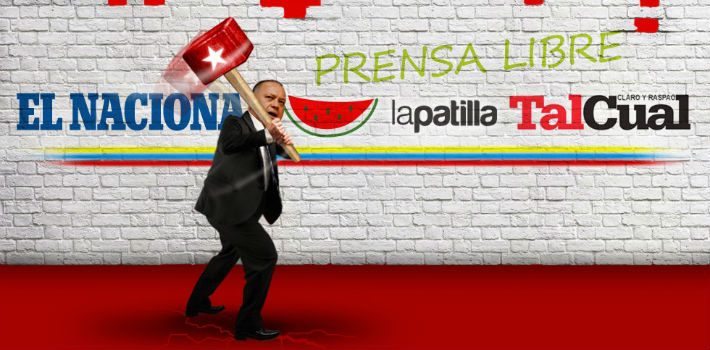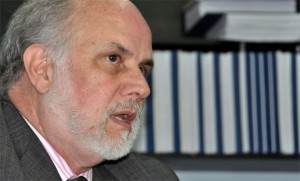
EspañolTwenty-two media directors are prohibited from leaving Venezuela and have to show up to court every week, following a lawsuit by National Assembly President Diosdado Cabello against national dailies El Nacional and Tal Cual and the news website La Patilla. Cabello claims these outlets have caused “grave harm” to his “reputation and honor.”
After Cabello filed the suit in April, a Venezuelan court proceeded on May 5 with charges of “aggravated and continuous defamation” against the three media outlets and their owners, who had each republished an article by Spanish newspaper ABC which claimed Cabello was involved in drug-trafficking and corruption schemes.
ABC released the article, also reported by several other local and international media, on January 25. Its author, investigative reporter and Washington correspondent Emili J. Blasco, reportedly received the information from Cabello’s former bodyguard Leamsy Salazar, who claimed that Diosdado Cabello is a kingpin in the Los Soles drug cartel.
The Venezuelan media affected by the measure issued by judge María Eugenia Núñez have yet to be formally notified of the bans. According to the Venezuelan law, once a judge admits a lawsuit, the defendants must be summoned to court, which was yet to take place at time of publication.
Pedro Nikeen, former head of the Inter-American Court of Human Rights (IACHR) and the International Commission of Jurists (ICJ), reacted to the news, saying: “In a globalized world, it’s absurd to punish a journalist or an outlet for faithfully reproducing, without adding to the news or making a judgement of value, what the foreign press has published about a public official.”
Tal Cual Director Manuel Antonio Puyana Santander, in the absence of judicial notification, attended court to personally monitor the progress of Cabello’s lawsuit. On May 11, he learned that the judge had decided six days previously to ban the defendants from leaving the country.
On May 12, Miguel Henrique Otero, president and editor in chief of El Nacional, complained that judge Núñez had issued the order “without notifying” the defendants, calling the failure to do so “absolutely irregular.”
Otero alleged that the impartiality of Venezuelan judges had been destroyed, and that they instead take orders from the executive: “The Venezuelan judiciary doesn’t exist; justice in Venezuela is a tool of the executive to criminalize the opposition.”
No Crime in Reporting
The legal doctrine known as faithful reporting excludes journalist from liabilities arising from information produced by others, even when it’s false and potentially libellous, when the reporting of the original story is done accurately.
Spain’s Constitutional Court accepted the doctrine in an appeals case of a director sentenced for advocating crimes because his newspaper, Eqin, had reprinted press releases issued by the terrorist group ETA. The country’s highest court considered that the journalist’s right to inform and the reader’s right to receive the information in full and faithfully was an objective constitutional guarantee.
Argentina’s justice system applied the same principle in a 1986 case involving Julio César Campillay, whom La Razón and other newspapers had accused of involvement in a crime. The Argentinean Supreme Court acquitted the newspapers, ruling that they had just transcribed an inaccurate police report in which the authorities implicated Campillay in several crimes.
In 2004, the IACHR confirmed the legal doctrine with regard to the Mauricio Herrera Ulloa v. Costa Rica case. The IAHCR concluded that no crime is committed by reproducing third-party information.
The Organization of American States’ Special Rapporteur for Freedom of Expression has similarly backed this interpretation.
“Democracy requires a public, free-flowing and wide-ranging debate. Publishing information supplied by third parties must not be restricted by threatening the publisher with holding him or her responsible for reporting statements made by others. The contrary will abridge every person’s right to be informed,” says the OAS body’s Annual Report for 1999.
Venezuela, Home of Censorship

On Monday, the IACHR Rapporteur denounced that the Venezuelan government’s targeting of journalists and media, and the shortage of newsprint due to import restrictions, was damaging freedom of expression in the country.
“The IAHRC is especially concerned that the current situation has led to the reduction of spheres of public debate, in detriment to the right to free and independent speech, and the commitment to guarantees enacted by the international instruments Venezuela is part of.”
The Rapporteurship said it has received over 123 complaints of physical and verbal abuse, as well as other kinds of attacks against journalists and citizen reporters, the perpetrators of which are mostly policemen, soldiers, and government sympathizers.
On May 6, the Inter-American Press Society (IPS) said in a statement that journalists in Venezuela work “under extreme conditions.” IPS President Gustavo Mohme said freedom of expression in the South American nation is undergoing “frank erosion and decline.”
On April 28, Venezuela’s National College of Journalists recorded 37 instances of free speech violations over the first four months of 2015.
The guild warned the domestic and international community over the deep crisis as a result of newspapers shutting down over the lack of supplies, lawsuits against journalists and media directors, and the government’s refusal to renew radio licenses.
 Versión Español
Versión Español












